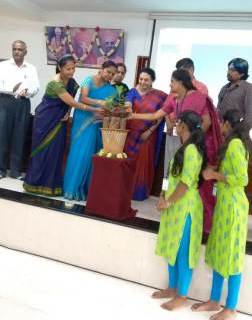Department of Botany
About Department:
In the year 1967, Department of of Botany started functioning by the blessings of Padma Bhushana, Karnataka Ratna Dr. Sree Sree Shivkumara Swamiji of Sree Siddganga Mutt. Former Principal Prof. Thippeswamy the management Commity members staff of this college raised funds from the donars of this District and organised a benefits of “Parvathi Kalyana” a drama by a famous Kannada cine actor Dada sahib Phalkae awardee Dr. Rajkumar and Smt Minugutare Kalpana a famous actress.
Smt K.L Radhamani took the charge as aHead of the department and served for 32 years. Sri S. Chandraiah and Sri Siddaveeraiah joined the department on 13th october 1999. Prof. Sri Vrushabendrappa and Sri Ananda Murthy were also appointed as a laboratory assisstant.
Smt K.L Radhamani was promoted as a Principal to Sree siddaganga college of arts, Science and Commerce for Women.On 1st Novemeber 1999. Sri S. Chandraiah took the charge as a Head of the Department. On 30th June 2000 Sri Siddaveeraiah retired for his duties. In 2001 S. Chandraiah got promotted as a Principal. He retired from his duties on 29th February 2004.
Sri K. Siddappa was transferred from Sree Siddaganga college of Arts, Science and Commerce for Women took the charge as HOD. On 20th December 2004 K.S. Geethanjali got appointed as Lecturer in Botany. In 2009 M. VasanthaKumar was appointed as Lecturer after superannuation of K.Siddappa, K.S. Geethanjali is reported as Head of the Department.
After retirement of Sri Vrushabhendrappa and Sri AnadaMurthy, Charankumar is appointemented as Laoratory assisstant. In 2001 Asha rani J B is transferred from SSCW to SSCASC.
HOD, Botony
Prof.K.S.Geethanjali
M.Sc, M.Phil (Ph.D)
Department News Updates:

Our Vision
- To provide innovative and action oriented ideas of growing and conserving,rare species of plants which are useful for the welfare of human beings.
- To create an awareness in the young minds about the problems of pollution,ecological imbalance,global warming and sustainable development
Our Mission
- To develop a better understanding among teachers and students,to encourage their active involvement in curricular activities of the classroom,and in understanding Flora and Fauna of local area.
- To Nurture scientific temper among the students and to motivate them to take up research work
Course Outcomes [CO's]
1 Aims:
- To transform curriculum into outcome-oriented scenario
- To develop the curriculum for discovery-learning
- To equip the students in solving the practical
- To adopt recent pedagogical trends in education including e-learning, flipped class, hybrid learning.
- To mold responsible citizen for nation-building and transforming the country towards the
- Learning Outcome Based Curriculum:
Curriculum is important in an educational system. It is focused r to achieve the objectives of each course of the programme and on the expected learning outcomes from each course
The objective based curriculum refers to the overall targets to be achieved through curriculum which may be long term or immediate.
- The learning outcome based curriculum has very close relationship with the learning of the
- To mould a responsible citizen and aware of most basic domain-independent knowledge, including critical thinking and
- In course learning outcomes, the student will attain subject knowledge in terms of individual course.
- The core courses would fortify the students with in-depth subject knowledge concurrently.
- The student graduated with this type of curriculum would be able to disseminate subject knowledge along with necessary skills to achieve e their capabilities for academia and entrepreneurship.
Programme Outcomes [PO's]
- The students will be able to explain various plant processes and functions, metabolism, concepts of gene, genome and how organism’s function is influenced at the cell, tissue and organ
- Students will be able to understand adaptation, development and behavior of different forms of
- The understanding of networked life on earth and tracing the energy pyramids through nutrient flow is expected from the
- Students will be able to demonstrate the experimental techniques and methods of their area of specialization in
.
Programme Specific Outcomes [PSO's]
The important relevant teaching and learning processes involved in this course are;
- Class lectures
- Seminars
- Tutorials
- Group discussions and Workshops
- Peer teaching and learning
- Question preparation
- Objective type
- quiz
- assignments
- Charts and models
- Unit test
- OHP
- Educational trip to study flora.
Faculty Details
| Sl. No. | Name of the Staff | Designation | Qualification |
| TEACHING STAFF | |||
| 1 |
Geethanjali.K.S |
HOD Assistant Professor |
M.Sc, M.Phil,(Ph.D) |
| 2 | Asharani.J.B | Assistant Professor | M.Sc.M Phil,B Ed |
| 3 | Pooja.N.G | Guest Faculty | M.Sc,B Ed |
| 4 | Yathisha Ardya | Guest Faculty | MSc,(Ph.D) |
| Non-Teaching Staff | |||
| 1 | Charan Kumar.D.S | Attender | MA (Political Science) |
